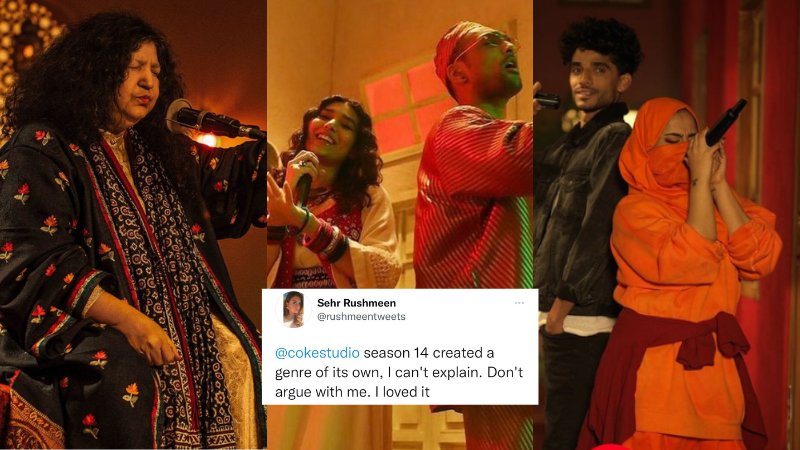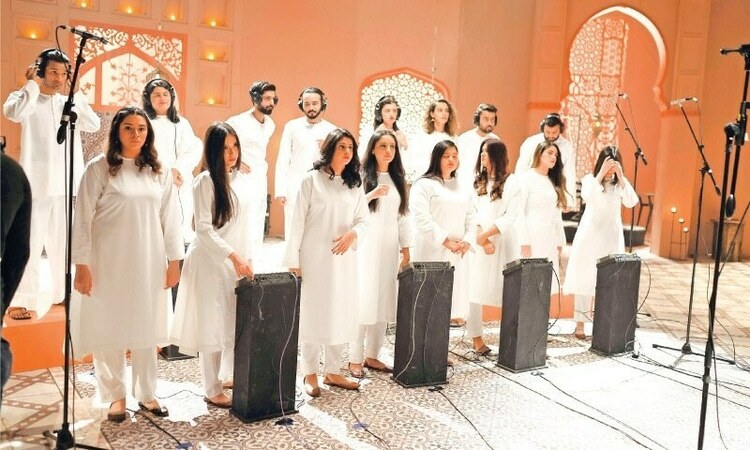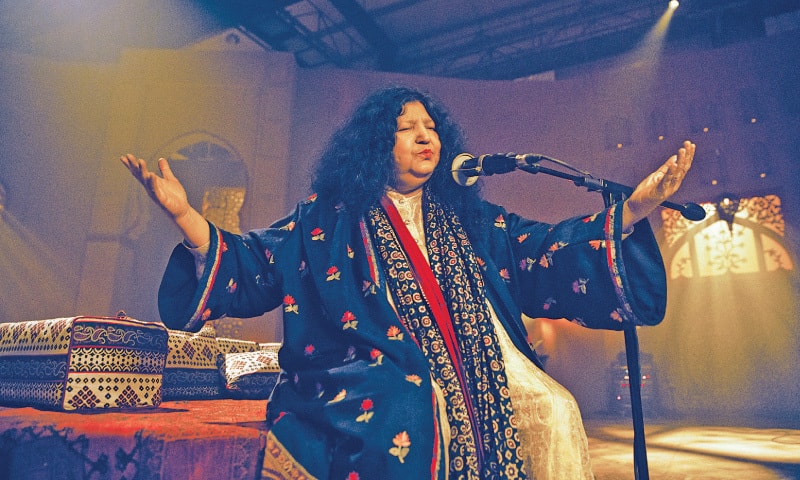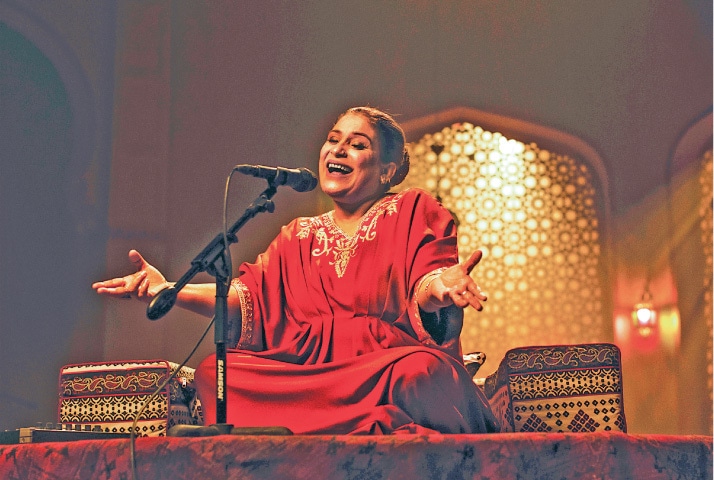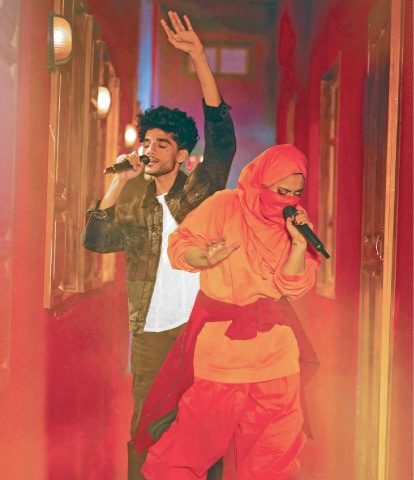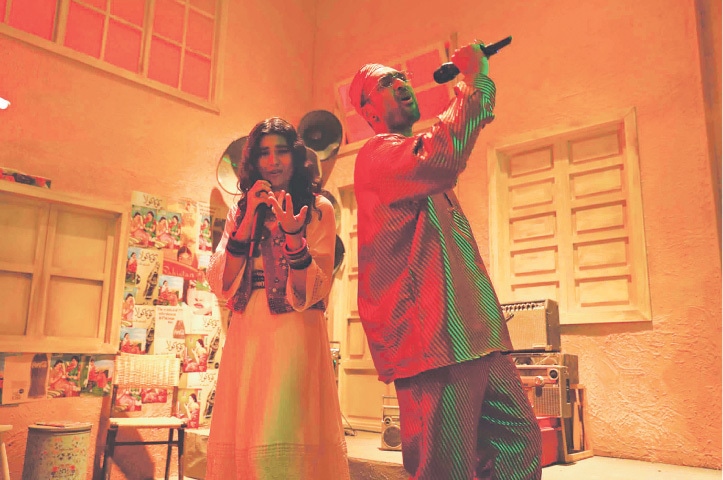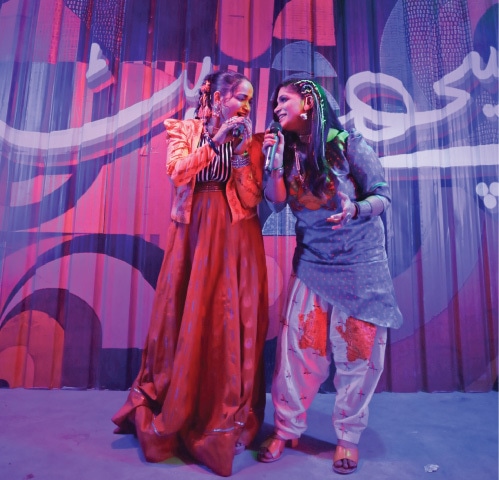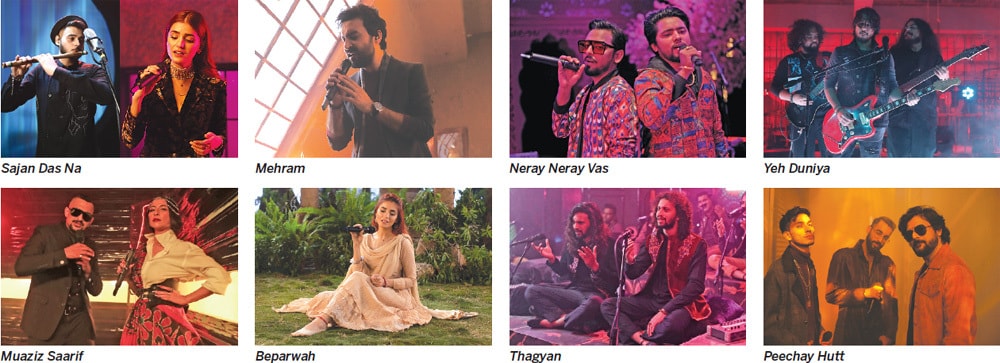.,.,.,.,.,
MALIHA REHMAN
SENIOR FASHION WRITER
Season 14 jettisoned its old format and baggage, bringing in new sounds to the fore.
There were no staged live performances. No electronic spins on nostalgic hits. No weekly episodes offering a selection of multiple songs. Not even an all-prevalent sponsor-inspired red and black theme in the videos.
Fourteen years strong,
Coke Studio (CS) decided that it needed to do a 180-degree turn and reboot completely. Just in time, too.
Or perhaps, not quite on time. The once-hit
CS format had started going stale some years ago. The yearly seasons had gotten repetitive and, while a song or two may have ended up becoming a hit, many more were quickly forgotten.
In its fledgling years,
CS had been a show that Pakistan had owned with great pride. The songs would blare out from car stereos and at events, became the focal point of multiple Twitter debates and did their duty well in promoting Pakistan’s always-in-need-of-promotion soft image to the world.
Under the direction of its new curator and producer Xulfi, Coke Studio was truly transformed this year, jettisoning its old format and baggage and bringing in new sounds and visuals that felt like a breath of fresh air. It was about time...
Lately, however, it was running the risk of becoming just another yearly musical show. The talkability that each song would earlier inspire had waned and even though different producers tested their mettle with a range of formats, nothing was quite working.
Abida Parveen
That is, until the show got upended this year, mixed with colour and a lively mix of electronic beats, blending veterans with music’s young guns, each song telling a completely different story. Perhaps the criticism levelled at the show finally managed to bring about this metamorphic change. Perhaps the sponsors finally realised that it was time to turn things around before the show died out completely. Basically, it was just time.
‘Tu jhoom, jhoom, jhoom, jhoom…’ chanted the iconic voices of Abida Parveen and Naseebo Lal and the audience swayed in unison. Overnight, it became an anthem for the broken-hearted, the thinkers, the ones struggling through life; everyone. Eureka,
CS was back like never before.
‘Kana yaari, gadaari, ishq nama gar ada,’ sang Baloch singer Wahab Ali Bugti with the sprightly Kaifi Khalil and Eva B joining in, in the next single that was released. The Balochi words weren’t understood by many but the mix of the beat and innate lyricism of the traditional dialect held you hostage. It made you tap your feet, hum the unknown words and, while it was in complete contrast to the spiritual awakening inspired by 'Tu Jhoom', you listened to this song also, again and again.
You also saw the videos again and again.
CS’ ingenious new curator and producer — although his name is certainly not new to Pakistan’s music scene — Zulfiqar Jabbar Khan aka Xulfi, has always believed that visuals and sound need to be merged together to form one powerful narrative.
While conversing with me, he observes, “If an entire line-up of songs are viewed in a single space, then people can’t associate new stories with every song. When a background is created for every song and then you release that song and give people the chance to absorb it, connect with it and get attached to it, it can bring out a powerful response.”
Naseebo Lal
This was but one of the changes calculated by Xulfi for bringing about
CS’s transformation. Instead of a weekly episode offering three or four songs, a single song was released at a time. The motley crew of 30-odd songs featured in past seasons was replaced by thirteen singles.
As mentioned earlier, the red-and-black soft drink-inspired stage was gone. Instead, specially designed sets broke the monotony, a different one for each song, and the songs were filmed as music videos and not as live performances. Art directors, costume designers, associate producers, musicians and, finally, the sponsor funding it all, came together to form Xulfi’s carefully curated musical army.
“Each song was the product of a unified effort by different creative minds, working together,” says Xulfi. “In my capacity as curator and producer, I set a certain vision and, then, we all connected to make each song matter and tell a different story.”
Each song was the product of a unified effort by different creative minds, working together,” says Xulfi. “In my capacity as curator and producer, I set a certain vision and, then, we all connected to make each song matter and tell a different story.”
It is undeniable that every
CS14 song stands out all on its own, although audiences will always have their favourites. 'Tu Jhoom' serves as the perfect kick-off. It’s followed by the upbeat 'Kana Yaari' which, Xulfi confirms, was especially positioned to come second, surprising people with its complete disparity to the first release.
Kana Yaari
'Mehram', blending the talents of Asfar Hussain with Grammy winner Arooj Aftab, is haunting and poignant. There is the upbeat 'Peechhay Hutt', bringing together Justin Bibis, Talal Qureshi and music’s latest superstar Hassan Raheem. 'Muaziz Sarif', with siblings Meesha Shafi and Faris Shafi collaborating, is an explosive, exhilarating mix of electronic beats, rap and Meesha’s signature fierce vocals.
'Ye Dunya', featuring Karakoram and Talha Anjum and Faris Shafi, arranges rap, rock, bilingual lyrics and flashing lights together, paving a trajectory of its very own and offering just a glimmer of past
CS songs. The groovy, catchy 'Thagyan' by Quratulain Balouch and Zain Zohaib is also reminiscent of
CS hits of yore.
Momina Mustehsan walks through a magic garden of sorts in her solo, 'Beparwah'. The song may not have created much noise simply because it leans towards conventional musical territory, but Momina does sing it beautifully. 'Neeray Neeray Vas' by Soch The Band and the Butt Brothers is less riveting, although the video tries its best to keep you hooked.
There were the Atif Aslam numbers — always particularly under scrutiny because of Atif’s immense fan following and clout. The mellow 'Sajan Das Na', with Atif collaborating with Momina Mustehsan, walks the off-beaten track and may not be everyone’s favourite initially. With its unusual highs and lows, however, it does tend to grow on you. 'Go', on the other hand, featuring the veteran Atif with one of today’s brightest young stars Abdullah Siddiqui, experiments and introduces new sounds, new ideas and holds you completely transfixed.
Ali Sethi and Shae Gill’s magnificent 'Pasoorri' was another all-out hit, offering a visual and audio experience that had the song playing on repeat. For Ali Sethi, it was a shift from classical music to more avant-garde, modern territory. It also steamrolled the young, up-and-coming Shae Gill directly into the spotlight, making her a musical favourite overnight and bringing corporate sponsorships and concert offers — so necessary for a musician’s bread and butter — her way.
Pasoorri
'Pasoorri' continues to top charts, not just in Pakistan but also internationally, even ranking number three on Spotify’s Global Viral 50 list. There’s the soft image getting pumped up, yet again.
Wrapping up the season was former
CS producer, ex-Strings frontman and one of the country’s most longstanding musical artists, Faisal Kapadia, collaborating with the youthful rap act Young Stunners in 'Phir Milenge'. The composition made the most of Faisal’s familiar timbre and left you yearning to hear more of him. Young Stunners’ inclusion added a certain element of freshness to the song.
The video itself was fascinating, with a single camera zig-zagging through corridors, the light and shadows changing as the song continued, entering a room where violinists played out a few strains in unison before the song continued. Beautiful.
In fact, quite as much can be written about the visual presentation of
CS14 as about the music itself; from 'Pasoorri' where Sheema Kirmani struck a classical dance pose, to the neon lights that flashed in unison with the beats of 'Peechhay Hutt', the colourful doorways of 'Kanna Yari', to the camera sweeping through the set in 'Go' to the dancers
jhoom-ing to Abida Parveen and Naseebo Lal’s 'Tu Jhoom'.
Peechay Hutt
“The visuals absolutely had to be expressive,” Xulfi tells me. “The feel had to be cinematic and unique. When we were recording 'Tu Jhoom', we actually lit up scented candles all over the set, in order to retain the mood of the song. It was important for every little aspect to merge together.”
He continues, “The final take of 'Tu Jhoom' was the one that we eventually made part of the video. I showed Abida ji a video from her youth, where she was singing and smiling and I told her, ‘Please bring this energy, this smile to this song’.
“The end result was beautiful and people opened up their hearts to it immediately. I have to admit, though, that I got too attached to this song. I had come up with the concept of 'Tu Jhoom' at a time when I had been particularly feeling low. I kept humming the title lyrics to myself. I have been in the habit of penning my personal observations about life and I took the list to Adnan Dhool and asked him to construct the song’s lyrics from them. He added his own learnings and his lyrical genius shows in the final song. The song ended up being very personal to me. It was only after it released that I realised that I had to detach myself from these songs.
“I had spent months of my life, cooped up in a single room, working on the songs, but now that they were going to release, they needed to belong to the audience and not just to me and my team. It is only when the audience takes ownership of a song that it becomes eternal.”
Xulfi continues: “In the very first presentation that I made to the
CS representatives, back when they were considering me as a potential curator and producer, I stated at the onset: ‘I accept who I am and I accept who you are’. I always knew that, while the show could stem from my vision, it could only be a success if it was steered by the unified efforts of different creative minds.”
Did he also decide not to feature any covers in the new season, a first for the show, which has always counted its covers of classic hits as some of its most popular numbers? “Covers are great because they introduce the musical sensibilities of the past era to the new generation,” says Xulfi, “but if we are going to concentrate on creating nostalgia, when would we bring new stories and new ideas to the forefront?”
But not every new idea has the power to become a sensation. Credit must be given again and again to Xulfi’s musical prowess for taking on the country’s most famous musical production while it was fast fading into the shadows, rejuvenating it and thrusting it straight into the spotlight. ‘Real magic’, the show’s tagline declares —and it is.
Is Xulfi afraid that he may not be able to conjure the same magic again, in the next season? “I’ll just start from nothing as I did this time,” he says. “I’ll attach myself to the process of creating the songs rather than focus on their success. And it’ll happen.”
Originally published in Dawn, ICON, April 24, 2022










